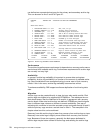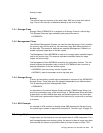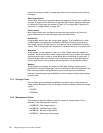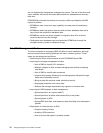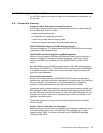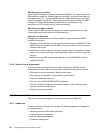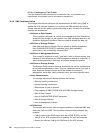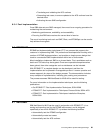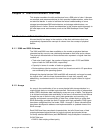
78 Storage Management with DB2 for OS/390
DB2 Naming Conventions
Certain parts of tablespace names are generated by DB2. This does not leave the
DBA with much scope for a flexible naming convention. For further information on
this subject see 6.1.7, “Assigning SMS Classes to DB2 Table Spaces and Index
Spaces” on page 53 and 6.1.8, “Table Space and Index Space Names for SMS”
on page 56. Ensure that the storage administrator is fully aware of any
restrictions so ACS routines can be coded accordingly.
DB2 Recovery Requirements
For purposes of DB2 recovery, the degree of integrity required for active logs,
imagecopies and archive logs must be decided upon.
Expiration of Data Sets
Management Class expiration attributes should be synchronized with DB2's
expiration information:
• Expiration of archive logs must be consistent with the value of ARCRETN. The
BSDS should be updated with the DB2 change log inventory utility to remove
deleted archive logs.
• Expiration of archive logs must also be consistent with the expiration of image
copies. This is described under “Deleting Image Copies and Archive Logs” on
page 21.
• Expiration of any DB2 image copies requires running the MODIFY utility to
update SYSCOPY.
8.4.2 Service Level Agreement
The service level agreement has to be drawn up between the DBA and the
storage administrator, and will include items mentioned in the previous section:
• The levels of service required by different data types.
• Performance, accessibility, and availability characteristics.
• The use of dedicated volumes.
• The use of the GUARANTEED SPACE parameter.
• The use of HSM management (automatic migration, recall, backup, space
release, and data set expiration).
• Data set naming conventions.
8.5 Conversion Process
This topic covers those aspects of planning and converting DB2 data.
8.5.1 Sequence
To ensure minimum disruption to services, the following sequence is suggested
for implementation:
• Libraries and other DB2 system data sets.
• Archive logs and imagecopies.
• User and testing tablespaces.
• Production tablespaces.



